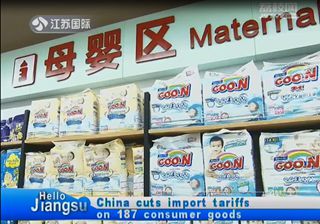China started to cut import tariffs on some consumer products by 9.6 percentage points on December 1st in a bid to satisfy increasingly diversified domestic demand and to facilitate the consumption upgrade.
The reduction of import tariffs will affect 187 tariff codes, including on food, health supplements, pharmaceuticals, garments and recreational products, and the average rate will decrease to 7.7 percent from 17.3 percent, according to the ministry.
Additionally, a tariff on some infant formula and milk powder products will fall from 20 percent to zero, while duties on diapers will drop from 7.5 percent to zero, according to a list on the ministry's website.
The latest changes are meant to "enrich domestic consumption choices," said a Finance Ministry statement. They take effect Dec. 1 and will reduce import duties on some products by up to two-thirds.
Encouraging consumers to buy foreign goods from Chinese retailers instead of while traveling abroad also can help generate jobs, said economist Lu Zhengwei of Industrial Bank in Shanghai.
It is a further cut since 2015, when the government lowered the tariffs on consumer products including certain apparel, footwear, skin care products and diapers, which dropped by more than 50 percent on average. The cut is in line with the country's policy to lower tariff barriers and its intention to boost domestic consumption of consumer goods, experts say.
Ouyang Cheng, director of the Alibaba Cross-Border E-Commerce Research Center, says the reduction of import tariffs indicates the Chinese government's determination to support globalization and call for further opening-up, despite a rise in trade protectionism and anti-globalization around the world.
The rapid development of Chinese cross-border e-commerce, especially the establishment of cross-border e-commerce comprehensive pilot zones, has provided experience for the government in adjusting import tariffs on consumer goods.






